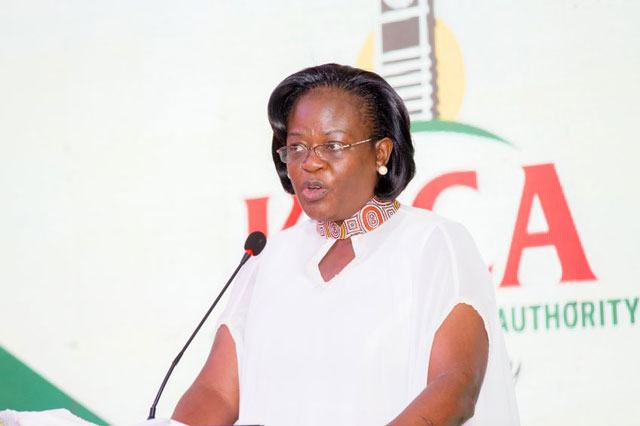Dorothy Kisaka, the former Executive Director of the Kampala Capital City Authority (KCCA), along with her deputy, David Luyimbazi, and the Director of Public Health, Dr. Daniel Okello, have been summoned by the Criminal Investigations Department (CID).
The three officials face questioning for their alleged negligence in connection with a fatal incident at Kiteezi landfill, where collapsing garbage killed at least 35 people.
According to police spokesperson ACP Rusoke Kituuma, the trio is expected to appear at CID headquarters on Wednesday.
“They have not been summoned today, contrary to some reports. We expect their statements on Wednesday to hear their account of the tragedy,” Kituuma told journalists.
Summons Ordered by President Museveni
The summons came after a directive from President Yoweri Museveni, who dismissed Kisaka, Luyimbazi, and Okello following an Inspector General of Government (IGG) report on the disaster.
“We are following this process smoothly. Their statements will be taken, and we’ll get their version of events,” ACP Rusoke added.
Kisaka took over the role of KCCA Executive Director in July 2020, following President Museveni’s recommendation.
Her duties under the KCCA Act of 2011 included managing Kampala’s public services, ensuring order, handling public funds, and providing technical advice to the Authority.
She replaced Jennifer Musisi, who resigned from the position in 2018.
The Kiteezi Landfill Disaster and Underlying Issues
The immediate reason for Kisaka’s dismissal was the collapse at the Kiteezi landfill on August 10, which left 35 people dead and caused millions of shillings worth of property damage.
However, some analysts believe that this incident was not the sole cause of her removal.
Dr. Hannah Muzee, a political science lecturer at Kyambogo University, suggests that the real issue lies within the broader challenges of public administration and resource allocation in the country.
“Kisaka’s leadership isn’t the only thing to blame here. The administrative and resource-related problems in Uganda’s public sector have been longstanding,” Dr. Muzee noted.
Financial Constraints and Public Perception
Earlier in 2023, Kisaka faced public scrutiny during the “Kampala Pothole Exhibition” on social media, which highlighted the poor condition of roads in the capital.
She admitted at the time that KCCA required between Shs75b and Shs100b annually for proper road maintenance but was allocated only Shs26b.
Despite acknowledging the financial limitations, some Ugandans felt Kisaka was not forceful enough in pushing for more funding.
“Kisaka needed to be more aggressive in demanding the resources required for the job,” said Robert Ssali, a student of International Relations and Diplomacy.
“Her soft approach didn’t match the urgency of the problems in Kampala, and that contributed to her downfall.”
A Background of Experience but Lacking in Technical Expertise?
Dorothy Kisaka is a lawyer by profession and previously served as a senior presidential adviser at the Office of the Prime Minister, coordinating public policy efforts.
She also held roles at Kiyimbi-Kisaka and Company Advocates and the Electoral Commission.
However, some political analysts feel that she lacked the necessary technical expertise to manage KCCA effectively.
Mwambutsya Ndebesa, a political commentator, believes Kisaka’s appointment was problematic. “Kisaka was put in a tough situation.
The role wasn’t advertised, and without adequate experience in managing a large organization, it became overwhelming. For jobs like these, it’s crucial to have a proper recruitment process to find the best fit,” Ndebesa said.
Achievements and Setbacks During Kisaka’s Tenure
Despite the criticisms, Kisaka did outline several accomplishments during her time at KCCA. In a report submitted in July 2023, she highlighted the reconstruction of 43.2 km of city roads, the construction of over 10 km of drainage systems, the installation of 535 streetlights, and the improvement of street frontages.
However, she also pointed to challenges such as insufficient funding and low staffing levels.
Even after her contract was renewed, public dissatisfaction remained high. Professor Sabiti Makara of Kabale University noted that while Kisaka pointed to achievements, many Ugandans still saw little progress in the state of the city.
“You might have done this or that, but when people look at Kampala today, they still see poor roads and drainage. Ugandans are still complaining,” he said.
Internal Conflicts Within KCCA
Kisaka’s time at KCCA was also plagued by internal conflicts, according to some observers. Frequent power struggles, ego clashes, and internal divisions painted a chaotic picture of the organization.
“These internal fights certainly did not help Kisaka’s public image,” Professor Makara added. “To the public, it seemed like she couldn’t bring order to the KCCA, and that contributed to her eventual downfall.”

